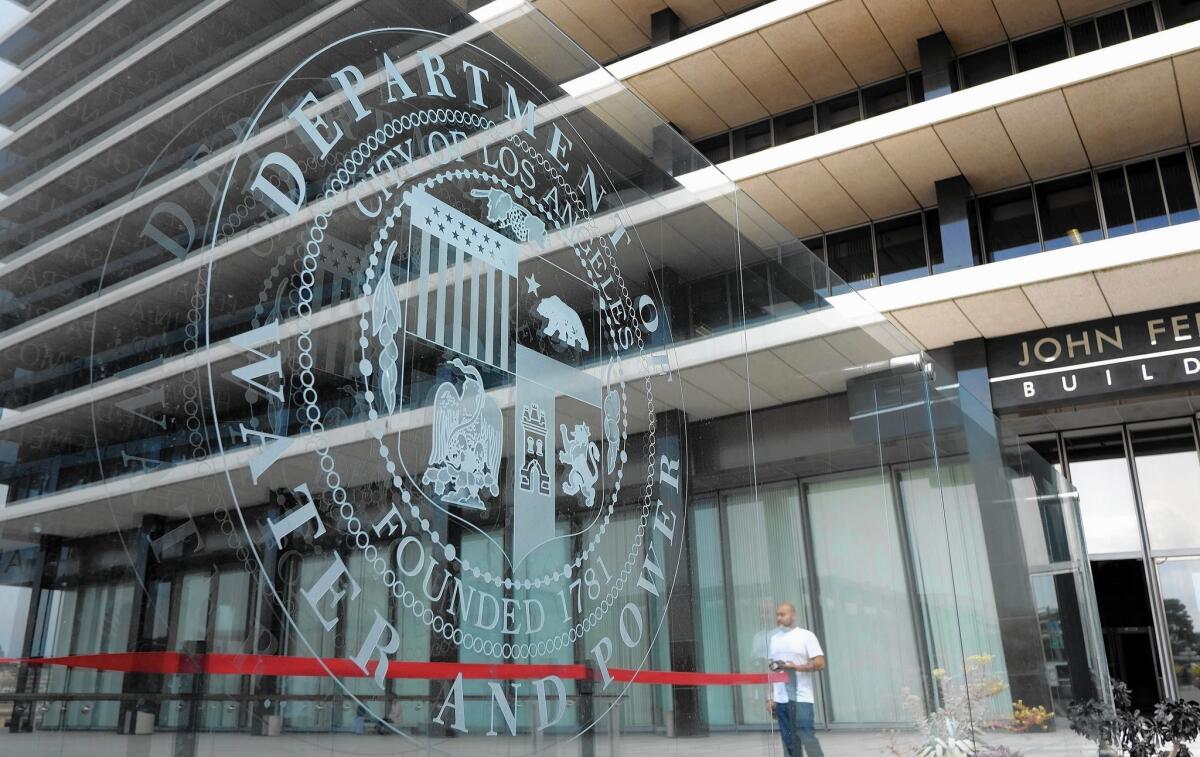Op-Ed: It’s time to give the DWP a reboot

The headquarters of the L.A. Department of Water and Power in downtown Los Angeles, seen in March of 2015.
- Share via
Every time you turn on a light or charge your cellphone, you pay a tax. Surprised? Many Angelenos don’t realize that hidden in their monthly bill from the Department of Water and Power is a big surcharge in the form of a 10% City of Los Angeles Utility Tax, as well as a “transfer” of 8% of all electric-related revenue to City Hall. In short, you’re paying almost 20% more for electricity than you should be.
For a typical residential DWP customer with an electric bill of $130, that’s about $25 each month that gets paid right into the city’s general fund and spent on things that have nothing to do with keeping the lights on. There is no question rates have to go up if DWP is to modernize its system to produce cleaner, more reliable power — but that issue is separate and apart from the question of how much DWP revenue should be siphoned off by City Hall.
Let’s dispense with the fiction that the DWP board controls utility rates, or for that matter, can control its costs, such as wages.
In the coming days, the City Council will vote on the largest power rate increase in DWP history — a cumulative hike of more than 20% over five years. Over the next decade, that will produce a windfall for the city’s coffers, almost $1 billion. To be clear — this money is coming out of ratepayers’ pockets, but none of it will be spent to improve the utility’s aging infrastructure, increase wind or solar power generation, or make service more affordable and reliable.
How has this happened? Because there is a complete lack of public accountability at DWP.
The utility ostensibly is run by a board of commissioners who — though well intentioned and hardworking — are all part-time volunteers and political appointees. So let’s dispense with the fiction that the DWP board controls utility rates, or for that matter, can control its costs, such as wages.
The mayor appoints the DWP general manager and the commissioners, and he can replace them at any time. (Pre-signed copies of their resignation letters are kept on file.) The ultimate decision-making authority on the upcoming rate hike and responsibility for how DWP is run rests with the mayor and City Council.
Four changes would transform DWP into a stronger, more efficient utility — and one free from unnecessary political influence.
First, immediately cap the amount of money — both the “transfer” and the utility tax combined — that is paid by DWP ratepayers to City Hall. After increasing for years, these fees now add up to about $600 million annually. Whether the 8% transfer is even legal is being debated in the courts, but the city should get ahead of the issue and put a maximum figure on all of these funds right now. We’re proposing a cap, not a cut — so it shouldn’t diminish city services.
Second, when rates do go up, a portion of the new revenue should be used to subsidize the power bills of low-income customers. Let’s take care of our city’s neediest families who sometimes can’t afford to keep their lights on.
Third, allow DWP to do its own hiring rather than be subject to a bureaucratic civil service process. These rules add unnecessary delay when DWP needs additional people and specific expertise to run its complex business.
Finally, replace the volunteer Board of Commissioners to give the DWP dedicated professional oversight and more independence. All members of the new board (and its staff) should be required to have relevant experience and be paid for their work. Staggered appointments to fixed five-year terms would, over time, assemble a board that reflected a succession of the city’s elected leaders but remained insulated from immediate political interference. The board then would appoint the DWP’s general manager and have complete control over revenues (including all rate hikes) and costs (like union contracts).
DWP services affect the daily life of everyone in Los Angeles. The city deserves a public utility that is operated in the long-term best interests of its customers, employees and our environment. For that to happen, we need the DWP to have strong, independent leadership.
Mickey Kantor and Austin Beutner are co-chairs of the independent commission LA2020. Its 2014 report “A Time for Action” made recommendations on how to achieve fiscal stability and job growth in Los Angeles, including an independent board to oversee DWP.
Follow the Opinion section on Twitter @latimesopinion and Facebook
More to Read
A cure for the common opinion
Get thought-provoking perspectives with our weekly newsletter.
You may occasionally receive promotional content from the Los Angeles Times.










